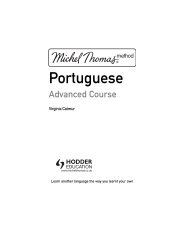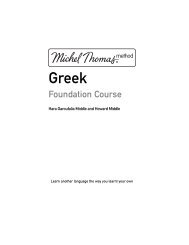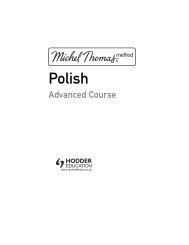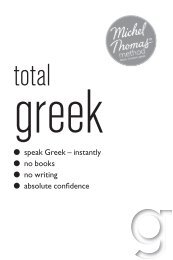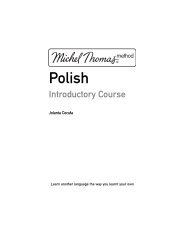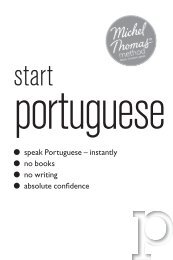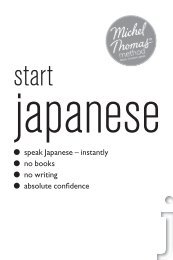MTM Foundation Polish:Polish - Michel Thomas
MTM Foundation Polish:Polish - Michel Thomas
MTM Foundation Polish:Polish - Michel Thomas
You also want an ePaper? Increase the reach of your titles
YUMPU automatically turns print PDFs into web optimized ePapers that Google loves.
12<br />
Czy pan / pani jest gotowy / gotowa? = ‘Are you ready?’ Czy can be<br />
omitted from short questions in colloquial speech.<br />
CD1 Track 5<br />
można ‘possible’ = ‘one can, one may, it is possible’; można? with<br />
rising intonation means ‘may I?’; nie można ‘not possible’ = ‘it is not<br />
possible’.<br />
kupić ‘to buy’; można to kupić ‘possible it to buy’ = ‘it is possible to<br />
buy it’; czy można to kupić?’ ‘is it possible to buy this?’<br />
The letter -ć is a typical ending for the basic or ‘to’ form of the verb;<br />
czytać ‘to read’.<br />
CD1 Track 6<br />
Mam ‘I have’ also means ‘shall I?’ or ‘am I supposed to?’; mam to<br />
czytać? ‘shall I read this?’<br />
robić ‘to do, make’; nie mam tego robić? ‘am I not supposed to do it?’<br />
już ‘already, by now’; jeszcze ‘still, yet’; jeszcze nie ‘yet not’ = ‘not<br />
yet’; pan jeszcze nie jest gotowy? ‘you (masc.) yet not is ready?’ =<br />
‘aren’t you ready yet?’<br />
CD1 Track 7<br />
przepraszam ‘excuse me, I’m sorry’; coś ‘something’; problem<br />
‘problem’.<br />
CD1 Track 8<br />
Adding -y is one of the most common ways of making a noun plural<br />
in <strong>Polish</strong>: problemy ‘problems’.<br />
Stress is almost always on the penultimate syllable in <strong>Polish</strong>; this rule<br />
applies even when an extra syllable is added to make the plural:<br />
dokument ‘document’, dokumenty ‘documents’.<br />
gdzie ‘where’.



